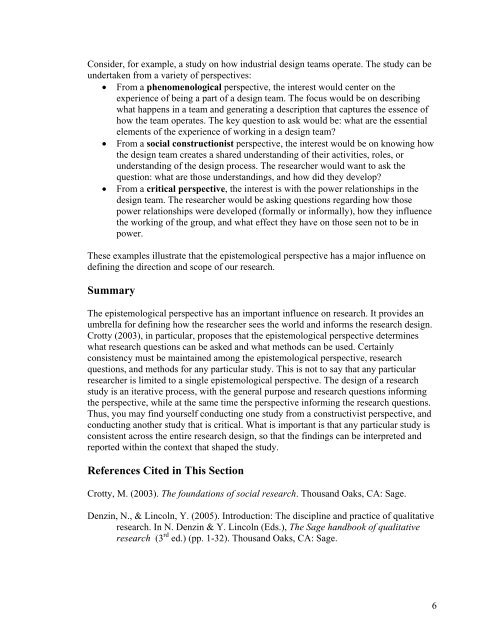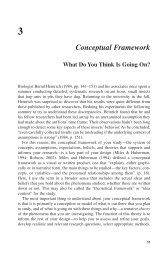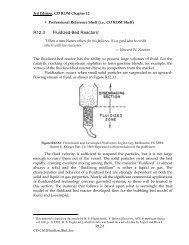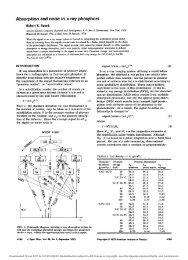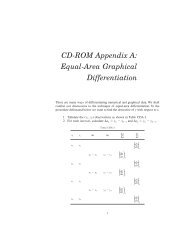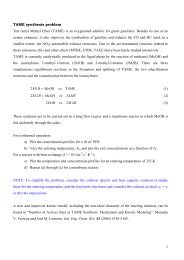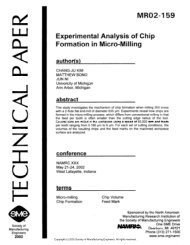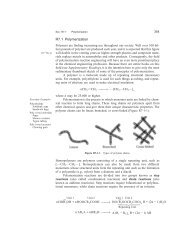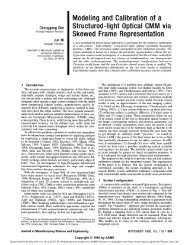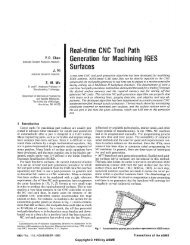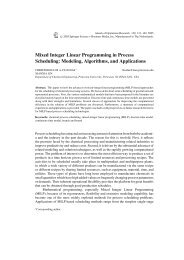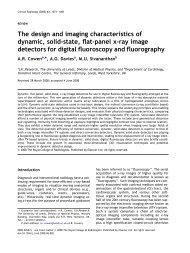Qualitative Research Basics: A Guide for Engineering Educators
Qualitative Research Basics: A Guide for Engineering Educators
Qualitative Research Basics: A Guide for Engineering Educators
Create successful ePaper yourself
Turn your PDF publications into a flip-book with our unique Google optimized e-Paper software.
Consider, <strong>for</strong> example, a study on how industrial design teams operate. The study can be<br />
undertaken from a variety of perspectives:<br />
• From a phenomenological perspective, the interest would center on the<br />
experience of being a part of a design team. The focus would be on describing<br />
what happens in a team and generating a description that captures the essence of<br />
how the team operates. The key question to ask would be: what are the essential<br />
elements of the experience of working in a design team?<br />
• From a social constructionist perspective, the interest would be on knowing how<br />
the design team creates a shared understanding of their activities, roles, or<br />
understanding of the design process. The researcher would want to ask the<br />
question: what are those understandings, and how did they develop?<br />
• From a critical perspective, the interest is with the power relationships in the<br />
design team. The researcher would be asking questions regarding how those<br />
power relationships were developed (<strong>for</strong>mally or in<strong>for</strong>mally), how they influence<br />
the working of the group, and what effect they have on those seen not to be in<br />
power.<br />
These examples illustrate that the epistemological perspective has a major influence on<br />
defining the direction and scope of our research.<br />
Summary<br />
The epistemological perspective has an important influence on research. It provides an<br />
umbrella <strong>for</strong> defining how the researcher sees the world and in<strong>for</strong>ms the research design.<br />
Crotty (2003), in particular, proposes that the epistemological perspective determines<br />
what research questions can be asked and what methods can be used. Certainly<br />
consistency must be maintained among the epistemological perspective, research<br />
questions, and methods <strong>for</strong> any particular study. This is not to say that any particular<br />
researcher is limited to a single epistemological perspective. The design of a research<br />
study is an iterative process, with the general purpose and research questions in<strong>for</strong>ming<br />
the perspective, while at the same time the perspective in<strong>for</strong>ming the research questions.<br />
Thus, you may find yourself conducting one study from a constructivist perspective, and<br />
conducting another study that is critical. What is important is that any particular study is<br />
consistent across the entire research design, so that the findings can be interpreted and<br />
reported within the context that shaped the study.<br />
References Cited in This Section<br />
Crotty, M. (2003). The foundations of social research. Thousand Oaks, CA: Sage.<br />
Denzin, N., & Lincoln, Y. (2005). Introduction: The discipline and practice of qualitative<br />
research. In N. Denzin & Y. Lincoln (Eds.), The Sage handbook of qualitative<br />
research (3 rd ed.) (pp. 1-32). Thousand Oaks, CA: Sage.<br />
6


